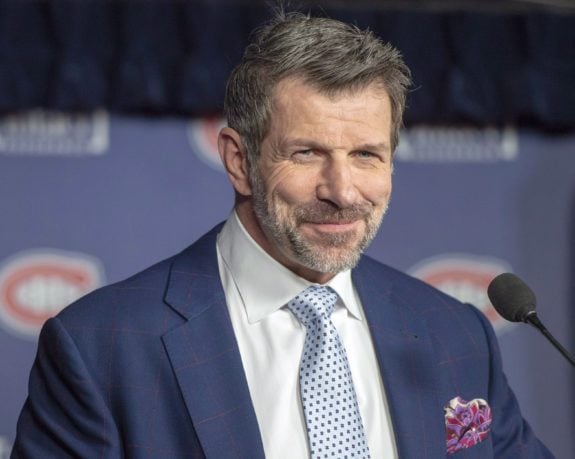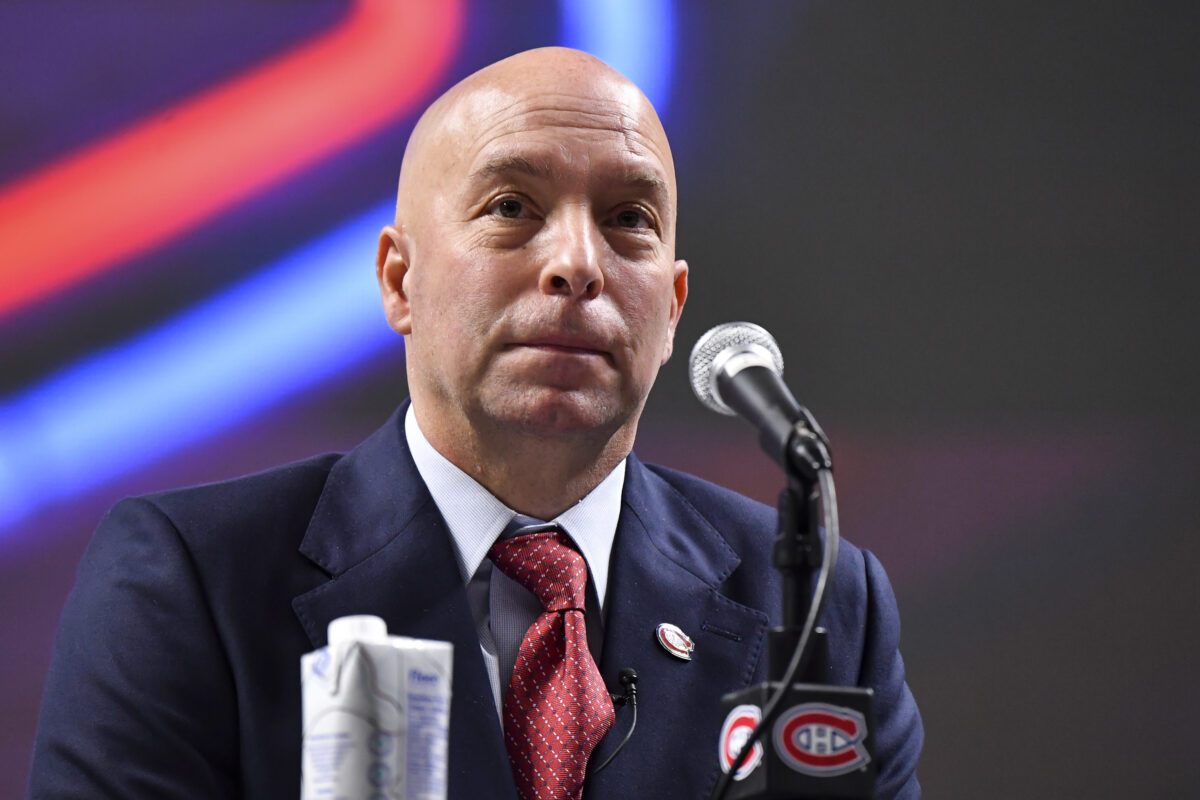Montreal Canadiens general manager (GM) Kent Hughes is entering his second full season at the team’s helm. He took over the job halfway through the 2021-22 season, replacing former GM Marc Bergevin. Bergevin was in the last year of his contract, and the Canadiens had just gone to the Stanley Cup Final, losing to the Tampa Bay Lightning in five games, but then the 2021-22 season started terribly for Montreal. Shea Weber and Carey Price were injured and likely not returning, and the rest of the team was hurt and tired from a long playoff run.
Bergevin might have been fired, but his fingerprints are still all over this team today. Hughes is still stuck with some large and long contracts handed to him by the previous management that will hamper him for some time to come.
Bergevin Was Good and Bad for the Canadiens
Bergevin was hired as the Canadiens’ GM in the summer of 2012. At that point, the team needed a rebuild but instead chose to retool. He had a young core of players like Price, P.K. Subban, Max Pacioretty, and Brendan Gallagher. In the 2012-13 shortened season—his first as GM—the Habs finished first in the division but lost in the playoff quarter-finals to the Ottawa Senators. The following two seasons were 100-point seasons for the team and they appeared very successful, except they could never make it through the playoffs. Bergevin was well-liked by the fans until the summer of 2016 when he traded fan favourite Subban for Weber.

After the Subban trade, the fan base became divided, and cracks started to show in the Bergevin regime. He began in 2012 with a great core but never could build around it. The team was successful on the ice but not in the playoffs as their needs for high-end scoring and a top-line center were never addressed. He was good at trades, but his drafting and development were lacking. Bergevin also deeply depended on Price to get the Habs through the season. He built a team with defencemen who played a similar style he did, which was more stay-at-home type defence. He did say “you have players that get you to the playoffs and players that get you through the playoffs” and he was right about that. The problem was that he built a team for the playoffs and not the regular season. If it weren’t for COVID, that last Cup run never would have happened.
Bergevin’s Parting Shot Was Terrible Contracts
In Bergevin’s final offseason, he had some free agents to re-sign, including Gallagher, a player he adored. At the time of his contract, Gallagher was almost 30, and his body was declining with multiple injuries. Bergevin still signed him to a long-term contract with a $6.5 million average annual value (AAV) that isn’t finished until after the 2026-27 season. This isn’t the only long-term contract that Bergevin has signed a player to that was either declining or not reaching their expected potential. Bergevin had a history of signing large contracts for mid-level players.
Related: 5 Worst Canadiens Contracts for 2023-24 Season
Bergevin also signed players like Joel Armia to a four-year contract for $3.4 million AAV. Armia has never scored more than 16 goals in a season and only once come close to playing 82 games. Christian Dvorak was acquired for a first-overall pick and came to the team with a $4.45 million contract to play as a third-line center. After the Canadiens’ Cinderella Cup run, Bergevin signed Mike Hoffman to a three-year $4.5 million AAV contract to add scoring and help the power play, yet Hoffman failed to deliver and is now a bottom-six winger. He signed Josh Anderson to a long-term $5.5 million AAV contract that doesn’t end until 2026-27. Anderson is a top-six forward but has only hit 20 goals twice in his career—once with Montreal—and is often injured. Bergevin left Hughes with many bottom-six players with very high, hard-to-move contracts.
Hughes Has Work to Do But Is Doing it Right
Bergevin left Hughes with a salary cap mess, full of struggling players with high-priced, long-term contracts. Although the team is in a rebuild and doesn’t need to sign veteran players, they still need cap space to sign their current young top players or take on large contracts for assets. With so many high-priced bottom-line players, Hughes is in a challenging position to balance the cap and improve the team. He did manage to extend captain Nick Suzuki and top goal scorer Cole Caufield, and he managed to move some money by trading Joel Edmundson. If it wasn’t for Price and Paul Byron on long-term injured reserve (LTIR), they may not have been able to spend what little money they did.

Hughes managed to do everything he needed to build the team his way: he got a first-round pick for taking on Sean Monahan’s contract, signed his two young stars and even extended goaltender Jake Allen. He still has all those high contracts to tackle, but the Hoffman contract will expire at the end of this season and Armia’s will after 2024-25. The best thing Hughes has done is not panic, and he hasn’t traded assets to dump contracts. Hughes still needs to address more extended contracts in Gallagher and Anderson. Anderson’s isn’t so bad because he is still under 30 and is still producing for the club. Gallagher, on the other hand, could be a big challenge with his injury issues and production decline. When you consider his age, his contract is horrendous.
Even though Bergevin left him with a mess, Hughes is in a good spot. He doesn’t have to rush to dump contracts or sell assets to clear space. Instead, he can wait for some contracts to expire and hope he can deal others but only for the return he wants. Granted, he still has Price on LTIR, which helps, but he is slowly cleaning up Bergevin’s mess and starting to do things properly for the Canadiens.